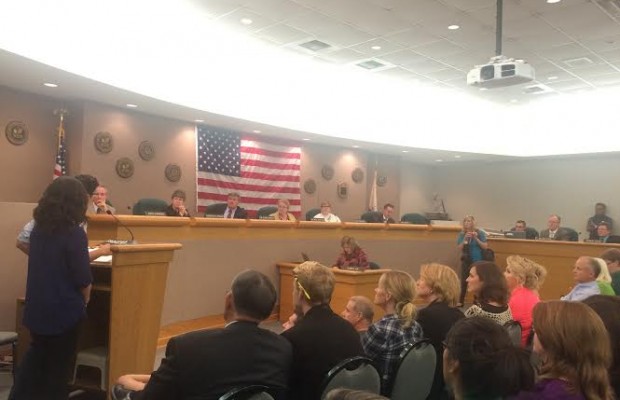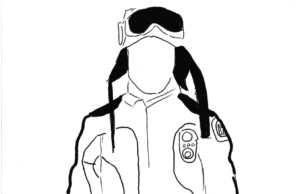Student rights and student innocence: magazine sparks controversy in community

At their meeting on March 17, members of the CVUSD school board considered an action item proposed by member Mike Dunn. The action item would “request” that the Panther Prowler print a front-page “uncensored rebuttal” written by parent Garry Pace, along with a picture of his choice in response to the Feb. 27 magazine cover spread “Sex: Undressing the Issue.”
After hearing from more than 40 community members, students, Panther Prowler staff, and parents who spoke at the meeting, the school board members had the opportunity to share their own thoughts on the item. Following the discussion, Dunn amended his action item to change the writer of the rebuttal to a student instead of Pace. In the end, the board voted against the motion with Board President Betsy Connolly as well as members Pat Phelps and Peggy Buckles in opposition, and members Mike Dunn and John Andersen in support.
STUDENT PERSPECTIVE
The school board vote came after many voiced various opinions on the cover article “Sex: Undressing the Issue” after the Panther Prowler distributed a special edition magazine on Feb. 27. The article discussed the emotional, religious, educational, legal and social aspects of sex, also covering the personal stories of several students who have had sex.
“I was shocked that the Prowler would (print) something that bold. Then I found out what the magazine was really about … so I read it, and it was amazing,” Chelsea Crall, senior, said. However, while many students and parents, such as Crall, found the article informative and relatable, others were offended by the pictures and subject matter.
“My issue wasn’t with what was printed, it was that I didn’t get to say whether I wanted to see that or not,” said Adam Hedelund, senior.
“I don’t think I couldn’t handle it, but I did think that (my parents) should’ve been able to see it,” agreed Anna Everett, sophomore. “I don’t really think it should have been published because I don’t know if students should have been talking about it. I don’t really know if students should be the ones informing other people about this kind of thing. I think it’s more of an adult responsibility, because they have more experience.”
Junior Jingjing Wu, on the other hand, believed that the article was well-written and was relevant to high school life. “I did believe (the article on sex) was written pretty respectfully and objectively, and it put all the views on the table,” Wu said. “I think it was a pretty good idea to (cover sex), because it’s so prevalent in American culture, but for some reason it never comes up at all – the whole adult to student conversation.”
Crall was initially unaware of how sex affects her peers. “(The article) made me realize how much I didn’t know,” she said, “so I think it was very helpful and beneficial to me personally.”
However, there were a few who felt that the article’s content overemphasized stories of those who had sex and did not focus enough on students who chose abstinence instead.
“I felt like a lot of kids were justifying their actions with a lot of positives, and almost none of them had said that they regretted their decision,” Everett said. “I think there should have been more people (covered) who had stayed abstinent and how that has made them happier. I feel like it was reflected in the article that a lot of people (have sex) but that isn’t really true.”
Some students also felt that the distribution was too aggressive or forceful, leaving them no choice as to whether or not they wanted to discuss the issue of sex or view pictures of condoms. Hedelund suggested that the magazine should have a paper cover warning readers to read further at their own discretion, while Everett suggested it should have only been distributed at the quad, and not the gates.
However, Co-Editors-in-Chief Grace O’Toole and Courtney Brousseau disagreed that the distribution of the magazine was aggressive. “When we distribute, students can choose whether or not they want to take a copy,” O’Toole said. “We talked with the staff before distribution to ensure that they were respectful and considerate when offering magazines to students.”
“For each of our issues, we print 1,000 copies for a student body of over 2,500,” Brousseau added. “We only want to give our publication to those students who actually want to read it.”
PARENT REACTIONS
Some parents were indeed dissatisfied with the lack of forewarning, believing that they should have been able to give explicit permission to allow their students to view the magazine. Some even argued the magazine, especially the photographs accompanying the article, were pornographic and a form of sexual harassment.
“The Prowler Staff … forgot to consider those students who might have been offended by the pictures and words the article published,” said Garry Pace, father of NPHS graduates and current grandfather of an NPHS student. “There were many students who felt offended, and their rights to be free from sexual harassment at school may have been violated.”
On the contrary, other parents believed that the entire issue was appropriate and important, especially when students are of high school age and are bombarded with sexual content every day.
“I feel like there are far more pornographic pictures in everyday magazines or even on TV commercials,” said Julie Freeman, current parent of an NPHS junior. “I personally think that the students at the school have the right to print what they want within reason … for a high school newspaper for high school students, I think it was well within (their) rights.”
Michelle Cooley, parent of TOHS students and an aunt of NPHS students, felt that the article avoided the harmful physical effects of having sex, especially regarding sexually transmitted diseases, and suggested a district-level “combined STD party” as a follow up to the article. “Because of the Prowler Magazine, I am concerned about the health and safety of our minors (and) district-sponsored sexual harassment of our minors,” she said. “It’s an expensive endeavor, putting the District at risk for lawsuits and making school a hostile learning environment.”
At the board meeting, two of the three authors of the article, juniors Shreya Chattopadhyay and Kellie Levine, addressed the Prowler’s motivations for featuring teen sex. “Our purpose in writing it was not to promote an agenda of any kind, nor was it to represent our personal opinions,” said Levine. “Rather, the goal of the article was to shed light on an issue that we’ve seen affect our peers again and again but have never seen truly addressed in a way students can relate to.”
But Pace feels that, “even if the writers thought their motives were good, the pictures of the condoms were in very poor taste. In addition, the pictures of a boy and girl removing each other’s clothes were more than suggestive and the cover picture of the article was lewd.”
LEADING UP TO THE MEETING
In the weeks after the article was published, the issue was covered by the Ventura County Star, the Thousand Oaks Acorn, the Ventura County Reporter, and the Student Press Law Center. The Acorn also received several letters to the editors, both in support of and against the article.
Principal Joshua Eby, Superintendent Jeffrey Baarstad, and all five school members received emails with legal and emotional complaints in the days following the publication. Although both Eby and Baarstad viewed and read the magazine before Feb. 27, they met with O’Toole and Brousseau after distribution to ask that they take the article off their website.
Brousseau and O’Toole refused to remove the article from the website, standing by the article and the Panther Prowler’s right to publish it under California Education Code 48907, which gives student publications freedom of press under the First Amendment unless the content is legally deemed “obscene, libelous, or slanderous.”
CVUSD’s legal team, which reviewed the magazine before its distribution, determined that neither the article nor the photos were obscene.
When board president Betsy Connolly announced the board’s final vote, she emphasized that anyone who wanted their voice to be heard could write a letter to the editors, but that no formal request would be made. This decision was met with both agreement and disapproval.
“I know that there are people who might be upset by the pictures in particular, but in the end I think the board did the right thing,” said history teacher Steve Johnson.
Baarstad had similar confidence in the board’s decision. “The way our board president left it was probably the most appropriate way,” he said. “The students were here, they heard all the concerns and I’m going to trust that they are going to be good journalists and that they are going to print letters to the editor that may not be complimentary to their publication.”
However, some, including Cooley, did not share this opinion. “I fully expected the board to encourage the Prowler at the very least … to err on the side of caution so that students are better prepared to be healthy and safe,” Cooley said. “But instead, they congratulated the Prowler for their magazine. That was disappointing to me.”
Dunn, who proposed the action item, declined to comment, but in an email stated, “38 million people worldwide are now dead from AIDS. In America, last year, 31 percent of the white babies were born to unwed mothers … the Panther Prowler article was felt by many as contributing to the suffering.”
During the board meeting, Dunn expressed disapproval of Baarstad’s decision to not censor the magazine; however, Eby said that he did not feel the same.
“I don’t think we let the community down,” said Eby. “I think there are those in the community that supported the Prowler, and what the students were trying to do; I think there are those in the community that feel like this topic and some of those images were inappropriate for high school students, and it’s up to us to make those judgements. Did we make everyone happy? No, and I understand that.”
MOVING FORWARD
During the board meeting, Brousseau and O’Toole highlighted the Prowler’s current policy for feedback in the form of Letters to the Editors, in which people have the opportunity to publish their thoughts and opinions that are relevant to the student body. After hearing of this, several board members agreed that Dunn’s proposed request was unnecessary. The board made its decision, voting against the action item in a 3-2 vote.
However, after the meeting, only one Letter to the Editors was submitted. “I think that the irony in all of this is as loud as everybody was; they had the opportunity to submit Letters to the Editors, and they didn’t,” said Michelle Saremi, Panther Prowler adviser.
Additionally, in response to the board meeting, the Panther Prowler has decided to publish this article reflecting the wide range of responses and perspectives.
“It was the school who okayed it being distributed, they knew what was being released,” said junior Brandon Benton. “The school knew what it was, and they said ‘ok but wait until after school,’ so it (wouldn’t) distract students during school. So I don’t see the problem.”
“Just because the issue is sensitive, doesn’t mean that parents and students shouldn’t clarify their stance on these issues and why they think the way they do,” Wu said. “It’s commenting on issues that I believe should be brought to the table and should have a sort of controversy and shock value that gets people thinking and causes a stir and causes that issue to be discussed.”
Despite the opinion of the majority, some students found it more important to respect the minority’s opinion as well. “I appreciate the Panther Prowler’s stance on listening to the students and writing things that the students care about,” Hedelund said. “But I do think that certain changes need to be made to certain topics that are controversial to many people … you may be getting a large majority but we can’t forget the minority within all of that.”
Benton strongly supports the Panther Prowler, believing that the source of the taboo nature of sex is ignorance. “It’s not a secret at school, and it’s probably not much of a secret at home, it’s just that parents choose to ignore what’s right in front of them,” Benton said. “When it comes to sex there is no easy way of putting it, (in general) it’s right there in your face, and I think the magazine did a perfect job of showing that.”



